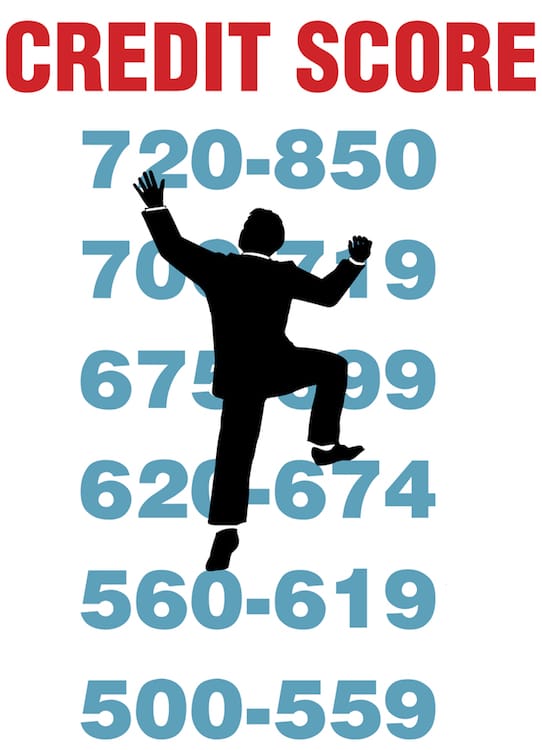
There are a lot of benefits to having a high credit score. The most obvious one is better access to credit. Someone with a high credit score will have an easier time getting approved for credit, will be given higher credit limits, and will pay less for that credit – with better interest rates. High credit score people pay lower rates for insurance, and with credit being increasingly looked at for hiring decisions having a good credit score could be the difference between getting that great job or not. So, how do you successfully get a great credit score?
“Success leaves clues. People who succeed consistently are not lucky; they’re doing something different than anyone else. They have a strategy that works, and if you follow their strategy and you sow the same seeds, then you’ll reap the same rewards.”
The Keys to Success, Anthony Robbins
What do people with a great credit score do that’s different than those with scores that are below where they want them to be? How can you model them to be successful?
Actually, what they’re doing differently is not that complicated. There are five main areas that if you focus on them and execute on them consistently you’ll significantly raise your credit score.
Pay Their Bill’s On Time
In short, people with a great credit score always pay their bills on time. It is a habit for them, and many with the highest credit scores have some form of system in place to ensure their bills are paid on time. If this is an area that can be a challenge for you, putting in place some kind of system that ensures your payments are made on or before they're due might be a good idea. Some areas to potentially look at are:
- Setting up automatic reminder emails or text a week or so out from the due date, can be a great way to ensure a payment doesn’t slip through the cracks
- Setting up auto-pay. Most companies now have an auto-pay function you can use to automatically have the amount due taken out of your checking account. This is a pretty full-proof way to ensure you pay on time, but you’ll also have to make sure you track those payments in your checking account so that you have adequate funds for your payments and your account remains balanced.
- And many with extremely high credit scores use a ledger or spreadsheet to track their payments due, payments made, and balances. A spreadsheet with your payment and balance information can really help you stay on top of your personal financial situation, and better plan for payments.
Minimize Their Account Balances
People with really high credit scores carry little to no account balances usually. This one isn’t a killer for your credit score if you’re carrying a modest balance on a card or two. When balances are beyond that it can be an indication that someone is overextended, which could lead to them being late or missing a payment. So for your credit score, they’re not looking to see if you have no balances, they just want to determine if you have too much debt relative to your financial situation.
When determining your credit score they look at your debt in 6 different ways.
- The overall amount owed on all of your credit accounts.
- The amount that’s owed across the different types of credit accounts you have – like credit cards or loans.
- Something called the credit utilization ratio on revolving credit accounts. And it’s simply the percentage of available credit you’re using. If you’re maxing out, that’s not good for your credit score.
- The number of accounts that have balances. The more you have balances the bigger the hit you’ll take on your credit score.
- How much of the total credit line you have for revolving debt is being used.
- How much of your installment loans is still owed. If you have a car loan for $20,000, it’s much better to $15,000 of that loan already paid off rather than $3,000.
In short, people with great credit scores don’t keep balances on their credit cards and other accounts. They live within their means, and pay balances as they come due.
It’s really that straight forward. If you do have debt that is negatively impacting your credit score the first step is to get a handle on all of the accounts – know how much you owe, and what the annual finance charge is on that balance. Then, look to payoff as much as possible each month on the balances with the highest interest rates, and pay the minimum amount due on the others. Then as you payoff each high interest account, switch to the next highest. Using this approach you’ll minimize the finance chargers you’ll pay as you’re bringing down your debt. And in turn that savings can be used to further pay down what you owe.
They have a long credit history
One thing to be sure to avoid is cancelling your credit accounts once you’ve paid them off. A factor in determining your credit score is the length of your credit history. People with great credit scores usually have accounts that have been in place for a long time, and show a positive payment history.
This one obviously takes a little time to achieve, but as a good first step – be sure to keep all of your current accounts, and keep on paying them on time.
They don’t get new credit unless it’s needed
It can be a temptation to apply for those offers that come through the mail saying you’re already “Pre-Approved” for their new credit card. The offers look great, and they often show happy people on a beautiful beach fully living their lives. Who wouldn’t want that? But don’t be fooled – it’s just a credit card offer, not a way to having a new life. People with great credit scores only get new credit when they absolutely need to.
This one isn’t as big a factor as the other areas. The FICO credit score, which is the score most commonly used, says that it’s only about 10% of your total score. You’re seen as a higher risk if you open multiple new accounts, and if you don’t have a long credit history.
No credit errors
One final area to focus on is errors on your credit reports. It’s possible you could meet all of the areas above perfectly, but still have a bad credit score because of an error in reporting your history on one of your credit reports. In fact, it’s been found that up to 25% of the credit reports out there have some form of error, which could potentially impact credit score. People with a great credit score generally have error free credit reports.
For this one you should start with a credit review. Pull your credit report from each of the three major credit bureaus – Experian, Equifax and TransUnion – and go through each to see if anything looks off. Errors can range from balances that are overstated, to detail about your payment history that is simply wrong. If you find there’s something there, there are really two ways you can take care of it: You can either do it yourself, or you can use a professional agency to help do the work for you.
There are advantages and disadvantages for both. In doing it yourself, you’ll be able to save a little money over hiring a firm to do the work. The disadvantages are it will take some concentrated effort to submit the disputes and correspond with the creditors and bureaus to get the error removals. It will take a little time and effort to learn the process to do disputes and how best to communicate to get the desired outcome of removing those errors.
The alternative of hiring a credit repair firm to take of this for you does have the disadvantage of having a cost. These are professional firms, and like any profession they charge a fee for their service. The advantages are you don’t have to worry learning “the ropes” in cleaning up credit, and don’t have to put in the time to get it done. Also, these firms are generally a little more effective in getting positive outcomes because of their expertise, and can get the work done faster.
But however you decide to approach it, if you want to be like those with a great credit score, you’ll been to have credit reports that are clean of errors.
And that’s really how they do it – the secrete to how they have great credit scores.
1. They pay their bills on time
2. They keep low account balances
3. They have good, long credit histories
4. They minimize new credit
5. They have no credit errors
That’s it! Stay on top of those five things, give it a little time, and before you know it you too can have a credit score Like a Boss!



